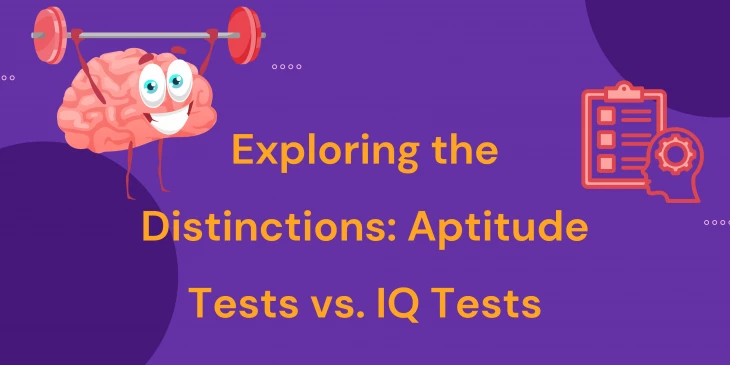Within the domain of evaluations and assessments, aptitude tests and IQ tests stand as two unmistakable apparatuses utilized to degree cognitive capacities and potential. Whereas they both dive into angles of human insights, they have particular characteristics, purposes, and strategies. Understanding the aberrations between these evaluations is significant for people looking for to translate their comes about precisely and for experts utilizing them in different settings.
Fitness Tests: Revealing Potential
Inclination tests point to evaluating an individual's intrinsic capacities, gifts, and potential for procuring particular aptitudes or performing certain assignments. These appraisals frequently center on assessing one's capability in regions such as consistent thinking, verbal comprehension, numerical capacity, spatial mindfulness, and problem-solving aptitudes. Fitness tests are commonly utilized in instructive settings, career direction programs, and work determination forms to gauge an individual's reasonableness for specific scholarly disciplines, employments, or work parts.
One of the key highlights of aptitude tests is their flexibility in diverse spaces and settings. They can be custom-made to degree aptitudes significant to particular callings or areas of study, empowering organizations to create educated choices with respect to enrollment, preparation, and career improvement. For occurrence, aptitude tests for designing parts may emphasize scientific thinking and spatial visualization abilities, whereas those for language-related occupations might prioritize etymological capability and explanatory considering capacities.
Besides, aptitude tests frequently comprise multiple-choice questions, situational scenarios, or commonsense works outlined to challenge candidates and inspire their problem-solving procedures. These appraisals regularly survey not as it were the rightness of reactions but the speed and exactness with which people handle the errands displayed to them. By surveying individuals' aptitudes, these tests offer profitable bits of knowledge into their cognitive qualities and zones for advancement, supporting personalized learning mediations and career-arranging endeavors.
IQ Tests: Measuring Cognitive Capacities
IQ (Insights Remainder) tests, on the other hand, are standardized appraisals planned to determine an individual's general cognitive capacities and mental potential. These tests ordinarily envelop a run of cognitive spaces, counting coherent thinking, verbal comprehension, spatial recognition, memory, and preparing speed. The results inferred from IQ tests are frequently spoken to as a numerical score, with the normal score set at 100 and deviations showing relative qualities or shortcomings compared to the populace norm.
Unlike fitness tests, which may center on particular abilities or competencies, IQ tests provide a broader appraisal of common insights. They point to evaluate individuals' capacity for problem-solving, unique thinking, and learning over different spaces. Verifiably, IQ tests have been broadly utilized in instructive brain research, clinical brain research, and neuropsychology to analyze mental inabilities, recognize giftedness, and evaluate cognitive working in clinical populaces.
IQ tests regularly comprise an arrangement of standardized assignments or questions managed beneath controlled conditions to guarantee unwavering quality and legitimacy. These errands may incorporate design acknowledgment, analogical thinking, lexicon appraisal, and numerical puzzles. The structure and substance of IQ tests may shift over diverse adaptations and organizations, but they all share the common objective of giving a comprehensive assessment of an individual's cognitive capabilities.
Key Contrasts and Suggestions
Whereas both aptitude tests and IQ tests survey perspectives of human insights, a few key contrasts recognize them in terms of scope, reason, and strategy.
-
Scope and Center:
Aptitude tests center on particular aptitudes or capacities important to specific assignments, callings, or spaces, while IQ tests give a broader appraisal of general intelligence over numerous cognitive spaces.
-
Reason:
Fitness tests are frequently utilized for educational and professional direction, career choice, and ability distinguishing proof purposes, though IQ tests have applications in clinical brain research, instructive brain research, and neuropsychology for diagnosing mental inabilities, surveying cognitive working, and recognizing giftedness.
-
Strategy:
Fitness tests ordinarily include custom-made evaluations of particular aptitudes through multiple-choice questions, situational scenarios, or down-to-earth works. In contrast, IQ tests utilize standardized errands or questions to a degree generally cognitive capacities beneath controlled conditions.
Understanding these qualifications is fundamental for people experiencing appraisals and for experts utilizing these instruments in different settings. Whereas aptitude tests give profitable bits of knowledge into individuals' particular qualities and potential ranges for improvement, IQ tests offer a comprehensive assessment of common insights and cognitive working. By leveraging the interesting traits of both sorts of evaluations, people and organizations can make more educated choices concerning instruction, career improvement, and psychological well-being. Feel free to comment down your views and our expert will get back to you. Happy Learning!![]()


Leave a Comment
To post comment, please